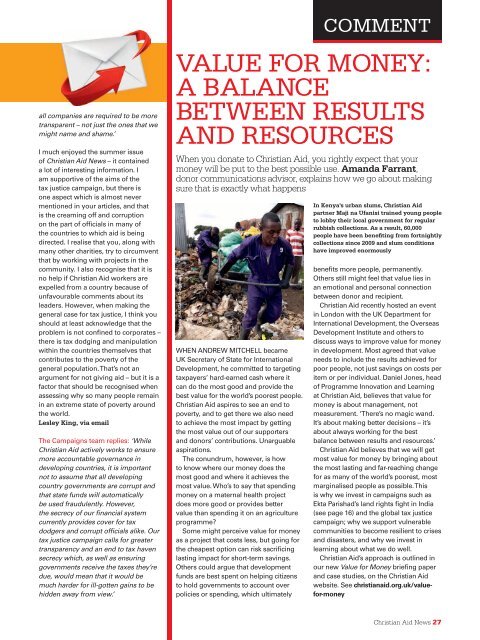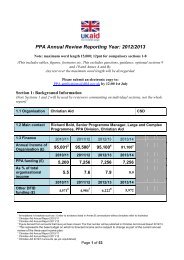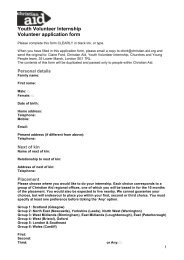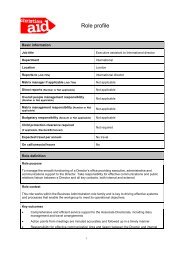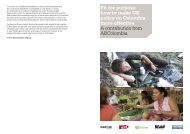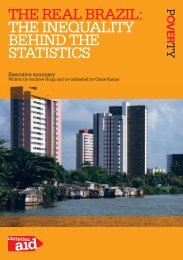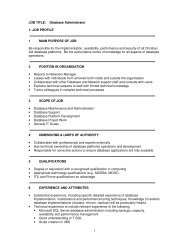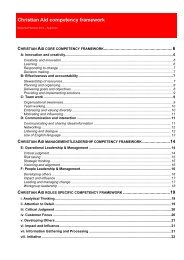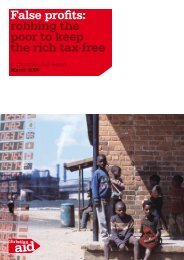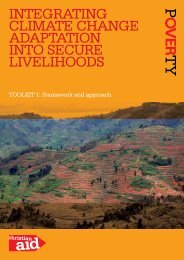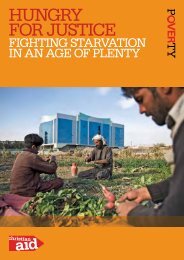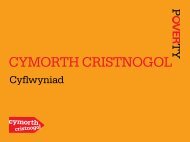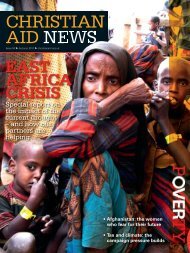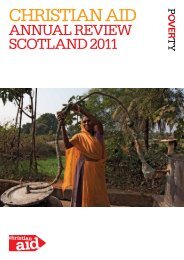CHRISTIAN AID NEWS
CHRISTIAN AID NEWS
CHRISTIAN AID NEWS
Create successful ePaper yourself
Turn your PDF publications into a flip-book with our unique Google optimized e-Paper software.
COMMENT<br />
all companies are required to be more<br />
transparent – not just the ones that we<br />
might name and shame.’<br />
I much enjoyed the summer issue<br />
of Christian Aid News – it contained<br />
a lot of interesting information. I<br />
am supportive of the aims of the<br />
tax justice campaign, but there is<br />
one aspect which is almost never<br />
mentioned in your articles, and that<br />
is the creaming off and corruption<br />
on the part of officials in many of<br />
the countries to which aid is being<br />
directed. I realise that you, along with<br />
many other charities, try to circumvent<br />
that by working with projects in the<br />
community. I also recognise that it is<br />
no help if Christian Aid workers are<br />
expelled from a country because of<br />
unfavourable comments about its<br />
leaders. However, when making the<br />
general case for tax justice, I think you<br />
should at least acknowledge that the<br />
problem is not confined to corporates –<br />
there is tax dodging and manipulation<br />
within the countries themselves that<br />
contributes to the poverty of the<br />
general population. That’s not an<br />
argument for not giving aid – but it is a<br />
factor that should be recognised when<br />
assessing why so many people remain<br />
in an extreme state of poverty around<br />
the world.<br />
Lesley King, via email<br />
The Campaigns team replies: ‘While<br />
Christian Aid actively works to ensure<br />
more accountable governance in<br />
developing countries, it is important<br />
not to assume that all developing<br />
country governments are corrupt and<br />
that state funds will automatically<br />
be used fraudulently. However,<br />
the secrecy of our financial system<br />
currently provides cover for tax<br />
dodgers and corrupt officials alike. Our<br />
tax justice campaign calls for greater<br />
transparency and an end to tax haven<br />
secrecy which, as well as ensuring<br />
governments receive the taxes they’re<br />
due, would mean that it would be<br />
much harder for ill-gotten gains to be<br />
hidden away from view.’<br />
VALUE FOR MONEY:<br />
A BALANCE<br />
BETWEEN RESULTS<br />
AND RESOURCES<br />
When you donate to Christian Aid, you rightly expect that your<br />
money will be put to the best possible use. Amanda Farrant,<br />
donor communications advisor, explains how we go about making<br />
sure that is exactly what happens<br />
Christian Aid/Elaine Duigenan<br />
WHEN ANDREW MITCHELL became<br />
UK Secretary of State for International<br />
Development, he committed to targeting<br />
taxpayers’ hard-earned cash where it<br />
can do the most good and provide the<br />
best value for the world’s poorest people.<br />
Christian Aid aspires to see an end to<br />
poverty, and to get there we also need<br />
to achieve the most impact by getting<br />
the most value out of our supporters<br />
and donors’ contributions. Unarguable<br />
aspirations.<br />
The conundrum, however, is how<br />
to know where our money does the<br />
most good and where it achieves the<br />
most value. Who’s to say that spending<br />
money on a maternal health project<br />
does more good or provides better<br />
value than spending it on an agriculture<br />
programme?<br />
Some might perceive value for money<br />
as a project that costs less, but going for<br />
the cheapest option can risk sacrificing<br />
lasting impact for short-term savings.<br />
Others could argue that development<br />
funds are best spent on helping citizens<br />
to hold governments to account over<br />
policies or spending, which ultimately<br />
In Kenya’s urban slums, Christian Aid<br />
partner Maji na Ufanisi trained young people<br />
to lobby their local government for regular<br />
rubbish collections. As a result, 60,000<br />
people have been benefiting from fortnightly<br />
collections since 2009 and slum conditions<br />
have improved enormously<br />
benefits more people, permanently.<br />
Others still might feel that value lies in<br />
an emotional and personal connection<br />
between donor and recipient.<br />
Christian Aid recently hosted an event<br />
in London with the UK Department for<br />
International Development, the Overseas<br />
Develop ment Institute and others to<br />
discuss ways to improve value for money<br />
in development. Most agreed that value<br />
needs to include the results achieved for<br />
poor people, not just savings on costs per<br />
item or per individual. Daniel Jones, head<br />
of Programme Innovation and Learning<br />
at Christian Aid, believes that value for<br />
money is about management, not<br />
measurement. ‘There’s no magic wand.<br />
It’s about making better decisions – it’s<br />
about always working for the best<br />
balance between results and resources.’<br />
Christian Aid believes that we will get<br />
most value for money by bringing about<br />
the most lasting and far-reaching change<br />
for as many of the world’s poorest, most<br />
marginalised people as possible. This<br />
is why we invest in campaigns such as<br />
Ekta Parishad’s land rights fight in India<br />
(see page 16) and the global tax justice<br />
campaign; why we support vulnerable<br />
communities to become resilient to crises<br />
and disasters, and why we invest in<br />
learning about what we do well.<br />
Christian Aid’s approach is outlined in<br />
our new Value for Money briefing paper<br />
and case studies, on the Christian Aid<br />
website. See christianaid.org.uk/valuefor-money<br />
Christian Aid News 27


